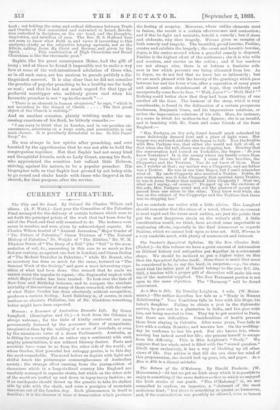Werona : a Romance of Australian Domestic Life. By Grace
Langford. (Remington and Co.)—A. book from the Colonies is always welcome ; for the links of kindly sentiment are more permanently fastened by the gossamer fibres of sympathetic imagination than by the welding of a score of ironclads, or even by the unanimous votes of a dozen Parliaments. Australia, as is fitting for a country (let us rather say a continent) with such mighty potentialities, is not without literary desires. Poets and novelists have come to us from the other side of the world ; of whom Gordon, that powerful but unhappy genius, is to this day the most remarkable. The novel before us depicts with light and skilful touch the picturesque commonplaceness of Australian society ; the strange effect ensuing from the juxtaposition of characters which in a long-civilised country like England are carefully arranged in separate strata, but which on the other side of the world are jostled up and down in topsy-turvy fashion ; as if an earthquake should thrust up the granite to take its station Bide by side with the chalk, and raise a precipice of mountain limestone out of the London clay. Each phenomenon in itself is familiar ; it is the absence of lines of demarcation which produces the feeling of surprise. Moreover, where unlike elements meet in fusion, the result is a certain effervescence and contention ; and if this be light and amicable, behold a comedy ; but if stern and obdurate, why then tragedy. Werona gives us samples of both comedy and tragedy. The beautiful, proud heroine, Pauline, creates and exhibits the tragedy ; the sweet and loveable heroine, Joyce, is the centre around whom a graceful comedy is disposed. Pauline is the highest effort of the authoress ; she it is who wills. and resolves, and carries on the action ; and if her resolves are not always wise, there is at bottom a feminine soft- ness in her which prevents our being alienated from her. As to Joyce, we do not feel that we know her so intimately ; but we are much pleased with the brevity of the greetings which pass between her and her lover when, after a separation of many years and almost entire abandonment of hope, they suddenly and
unexpectedly come face to face. "'Well, Joyce ? Well, Hal P' Nothing could better show that they had been thinking of one another all the time. The humour of the story, which is very considerable, is found in the delineation of a certain prosperous tradesman, Benjamin Gann, and his impecunious relations, or rather the impecunious relations of his wife. Here, for instance,. is a scene in which his mother-in-law figures ; she is an invalid, and is lunching with Mr. Gann and some friends of his from England :—
"Mrs. Parkyns, on the sofa, found herself much refreshed by some deliciously dressed fowl and a glass of light wine. Her tongue was unloosed, and she also began to talk. Now the trouble with Mrs. Parkyns was, that either she would not talk at all, or that when she did talk, there was no stopping her. Hearing that the conversation bad turned on Yorkshire, she began : 'Do you know Yorkshire ? It is the county where my family comes from —you may have heard of them. I come of two families, the Cloppertys and the Trotters. You do not know of them. Dear me, I wonder at that ; my mother was a Clopperty, and my father was a Trotter. Ha was at one time Mayor, but I can't remember what of. My uncle Clopperty also married a Trotter. Dobbs, do you remember, was it John Clopperty that married Anne Tretter, or was it Anne Trotter that married John Clopperty ? Dear mee what am I saying—of course V Propped up on the cushions of the sofa, Mrs. Parkyns could not see the glances of agony that passed from one sister to the other. They know well when she was on the subject of the Cloppertys and the Trotters that there was no stopping her."
Let us conclude our notice with a little advice. Mrs. Langford should remember that the crises of a novel, where the mevement, is most rapid and the turns most sudden, are just the points that put the most dangerous strain on the writer's skill. A little consideration would, we think, have averted some improbable or unpleaeing effects, especially in the final d6nouement as regards Pauline, which we cannot look upon as true art. Still, Werona is a very readable novel, with plenty of amusemont and interest.


































 Previous page
Previous page